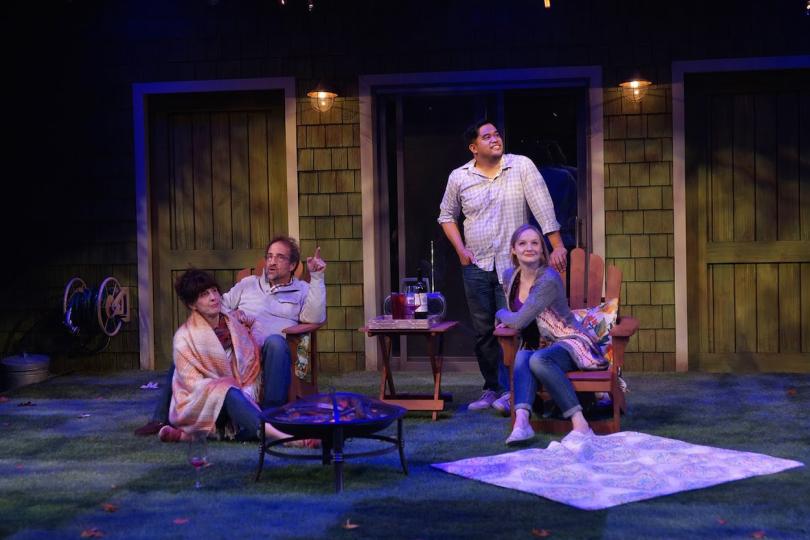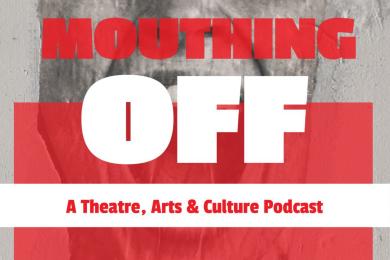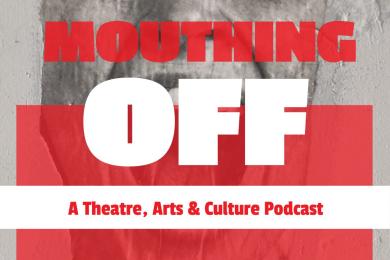Emerging Artist Profile: Abbee Warmboe

Although you may not have met Abbee Warmboe, chances are you have seen her work. Before working with Abbee on a production earlier this year, I only heard whispers of this young, talented props designer. So when I saw her work and spent tech week alongside her, I knew she had to be on my interview list. Besides being extremely talented, I was completely impressed with her career: Abbee has been able to make a living, more or less, on being a props designer - she even has a house in Minneapolis!
Her prop designs have been on almost every stage in the Twin Cities--and even some neighboring towns. Everytime I log onto Facebook and see a post of her in tech, asking for advice on a prop build or--most importantly--her iconic “Where’s Lily Bean” photo tag, I'm inspired. There is this notion that the arts is not a viable career, but Abbee has made it workso far. And although she admits it is hard and requires a lot from the individual, her career definitely inspires me each day.
So, Abbee, who are you?
I’m Abbee Warmboe and I am a freelance properties designer - or, well, everyone has their own title for “props person”. I generally go by Props Designer. That means that I bop around town doing props!
Where are you from?
I grew up in Minnetonka - not too far away from the Cities. And then I went 30 minutes away to Northfield, Minnesota [St. Olaf| for college. I got a BA in Theatre and even dabbled in some film and media studies too. After graduating, I moved back to the Cities - and the rest is history.
When was that?
2010.
You mentioned that you go by the title “Props Designer”. Why do you go by that over Props Master, Props Manager, or any of the other versions?
Well, I know I don’t like Props Mistress because it makes me giggle. Sometimes companies ask me which title I want, which is nice because in the program, if it reads “Set Designer, Costumer Designer, Lighting Designer” and then I am “Props Manager”, people ask me what that is because it stands out from the rest.
Have you actually been called “Props Mistress” before!?
Yeah! Sometimes it is even in my contract. I scribble it out and write Props Designer instead [with a laugh]. It depends, I guess, on what you really are doing. Some set designers give you what you need, so you are mostly just gathering those props. But some prop design gigs are really true design gigs and require one to really create something.
It is like “we need this special thing to do this special thing, so make it happen!” while other times it is just collecting, or managing, what is needed. And then that gets into the set dressing too. Like, are you just managing the set dressing or are you actually creating something?
Well then, what brought you into the world of props?
When I was in college, I was focusing on set design and scenic painting. I put all my effort into that. We had this huge prop storage in college, so the scene shop usually just got that responsibility. They would be like, “pull all these things that fit into this world.” but it was never a real academic category. But then when I graduated--which was a semester early in order to save money--at first I thought it was a good idea, but then I realized I had no plan! I did not ask all those questions you’re suppose to ask. But then my friend suggested this summerstock opera they used to work at. The only opening they had was for props. I applied and they assured me I was qualified, so off I went to do a bunch of props for these opera shows in Iowa. When I came back, I still had no other prospects until someone said that the Cities lacked prop designers. I thought it would be a good steppingstone to do set design, so that was kind of my plan - which wasn’t really organized. I guess I sent a bunch of theaters my resume with my sad, three opera shows on it. Then some theaters ended up really wanting me. I came to really enjoy props.
What skills would you say define a good props designer?
Being organized. One of the hardest things I feel about doing props is that anything could become a prop. There are just so many gray areas on what could be a prop, so in that first production meeting - or even before you sign a contract - if you not organized with those questions, you may become horribly surprised, or you’ll get to tech and realize that props you thought weren’t your job were actually your job.
So you always ask the show’s size and prop requirements?
Yeah, of course, but also for other specifics. Furniture is one example. Does the set designer do it or does the props designer do it? If you’re not organized enough to ask those questions right away, you could be in trouble. And then also knowing your skill level. If you’re more of a shopper then being approached to do a show that requires building a lot of weird props may not be for you. You need to know what the show is requiring of you and if that is in your skillset or not.
Do you like when directors give you a props list?
I always pull the stated items in the script as a starting list. But like with musicals, it might not be stated [in the text] that desks are needed for a dance number, but that is what the choreographer wants. So knowing those bits ahead of time, and then merging those two lists together really helps. But I feel that everything gets on a list - eventually!
So one thing I have noticed working as a costume designer and the few times I have been a props guy, is finding stuff is important. Where do you find props?! To all the budding prop designers: where should they look?
That is a great question, actually. It is hard nowadays because a lot of theaters are getting rid of their storage, so there isn’t even a small stock to pull from. But there are great resources like the Guthrie, Chanhassen, and TRP [Theatre in the Round]. Some of the larger houses have furniture, which is nice because then you don’t have to go out and buy everything, which can waste your budget. And of course there is the Internet for thrifting. It is more helpful but more expensive.
There is also social media with special Facebook groups where I can write, “Hey! I really need this gurney, does anyone have one?”
So you think that social media world is becoming more and more useful?
I do - it is really useful. I am new, however, to the Facebook groups as a way to ask for things, but I think it is good. I even have a house full of things, so if someone asks, “Anyone have a barrell?” I can respond, “Yeah, I have one in my basement!” It goes both ways. LIke, there are just those things that are really annoying, like a functioning gramophone, so it is nice to have more options.
You mentioned earlier that you want to do scenic design. Is that something you’re seeking to do ultimately?
It is not what I want my career to be because right now I am super fortunate to make 80% of my income doing prop designs, with the other percent being some scenic design, [scenic] painting, and teaching. I don’t think I would want to make a career being a set designer, but it is nice to have those sprinkled throughout my season.
Why is it nice?
For the income, but also because I spent many years - even in high school - wanting to do set design, so it is a bit of that “Look! I am doing what I intended to do!” And it is also nice because then I normally do set and props together - being able to create the whole environment is fun. I like being able to create the world the props live. But to do that many shows all as set designer? Oooff, I think I am out of artistic shape for that! So much drafting!
What are some problems or issues that you see for prop designers?
Some challenges is that every place does it differently, so again, that’s why asking those questions is important. And of course the common “time and money” challenges.
I feel like my personal struggle is balance. I have discovered that props people don’t get paid that much so having enough income is challenging. I normally do between 40 and 55 shows a year. I stopped counting because it was not good for my mental health. That does, however, include some scenic design and painting work, but it still feels like too many. I am just in tech all the time!
How does that work with your social life?
(With a laugh) Oh jeez, Lucas! I am still figuring it out. I think the way I fit all in is lack of sleep and a lot of coffee. I also have a lot of friends at work, so we get dinner during tech or something. There is that social aspect.
Your theater friends understand, but other groups of friends don’t, which is hard if there’s like a baby shower on Saturday but you’re in tech.
What is the weirdest prop you’ve ever had to design?
Oh gosh! Well, I feel like they're all weird in a certain way. I have moments where I just stand there asking, “What did I do with my life to lead me to where I need ____!?!?” For hardest, however, it always goes to special effects--like if you need electricity running through it or something. There was this air conditioner that had to get bashed apart with a baseball bat every night. For a little while it did still blow air through it, but then the bat smashed that mechanism. So, how do you make an air conditioner that needs to get bashed apart and put back together every night, still blow air, and last for 40 shows? That’s the challenge. I will say that in the end it was not 100% successful, but I did learn a lot. So if you ever need another bashable air conditioner, I learned a lot from my flaws. Oh! I did have to make this mound of rice boxes, which were literally boxes covered in rice with twinkle lights on them. And they were made here, in this living room, where we are sitting right now.
You’ve talked a lot of knowing your skill sets and being organized, but what about some advice for young props designers, scenic painters, and even technicians out there?
You can’t wait for the opportunities to come to you. Like, I wanted to do tech theater in high school, so I would just ask “Can I paint that?” or “Can I design what’s on that wall?” I had work study in college, so I just bothered that TD until he hired me to do props. I would just ask to design show after show. So since coming to the Cities, it was just being persistent, especially since no one knows who you are. Give your resumes to theaters and then give them an updated one when you don’t hear back. But then when you do get your foot in the door, do your job and be a pleasant person.
Abbee Warmboe is a freelance properties designer based out of the Twin Cities. Her recent work includes; Mixed Blood: Orange, Barbecue; Theatre Latté Da: Ragtime, Gypsy; Mu Performing Arts: Tot, You For Me For You; Park Square Theatre: Realistic Joneses, The Liar, Great Expectations; 7thHouse Theatre: The Great Work; Yellow Tree Theatre: A Gone Fishin’ Christmas, Death of a Salesman, Violet. Her work can also be seen with Artistry, Chanhassen Dinner Theatre, DalekoArts, History Theatre, Mad Munchkin Productions, Old Log Theatre, Stages Theatre Company, Stepping Stone Theatre, Theatre Pro Rata, Walking Shadow Theatre Company among others. Upcoming projects include Orphan Train with History Theatre, The Passage with 7th House Theatre, Snowed Inn with DalekoArts, and All is Calm and A Christmas Carol Peterson with Theater Latte Da. Abbee along with the rest of the design team for Live Action Set’s Crime and Punishment received a 2015 Ivey Award Recognition for “Production Design”.




